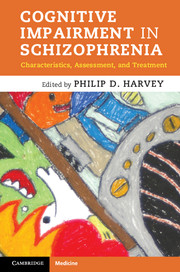Crossref Citations
This Book has been
cited by the following publications. This list is generated based on data provided by Crossref.
Sumiyoshi, Tomiki
2013.
Encyclopedia of Psychopharmacology.
p.
1.
Medalia, Alice
Opler, Lewis A.
and
Saperstein, Alice M.
2014.
Integrating psychopharmacology and cognitive remediation to treat cognitive dysfunction in the psychotic disorders.
CNS Spectrums,
Vol. 19,
Issue. 2,
p.
115.
Строгова, Светлана Евгеньевна
and
Зверева, Наталья Владимировна
2015.
Психопатологические и психологические подходы к квалификации психического дефекта при шизофрении у детей и подростков.
Psikhiatriya,
p.
37.
Friedman-Yakoobian, Michelle S.
Mueser, Kim T.
Giuliano, Anthony J.
Goff, Donald C.
and
Seidman, Larry J.
2016.
Family-directed cognitive adaptation pilot: Teaching cognitive adaptation to families of individuals with schizophrenia.
American Journal of Psychiatric Rehabilitation,
Vol. 19,
Issue. 1,
p.
62.
Cariaga-Martinez, Ariel
Gutiérrez, Kilian
and
Alelú-Paz, Raúl
2018.
Rethinking schizophrenia through the lens of evolution: shedding light on the enigma.
Research Ideas and Outcomes,
Vol. 4,
Issue. ,
Rego, Thomas
Farrand, Sarah
Goh, Anita M. Y.
Eratne, Dhamidhu
Kelso, Wendy
Mangelsdorf, Simone
Velakoulis, Dennis
and
Walterfang, Mark
2019.
Psychiatric and Cognitive Symptoms Associated with Niemann-Pick Type C Disease: Neurobiology and Management.
CNS Drugs,
Vol. 33,
Issue. 2,
p.
125.
Khromov, A. I.
Zvereva, N. V.
Sergienko, A. A.
and
Strogova, S. E.
2021.
Dynamics of Voluntary Verbal Memory Indicators of Children and Adolescents with Endogenous Mental Pathology During Treatment.
Psikhiatriya,
Vol. 19,
Issue. 1,
p.
63.
Brennan, Courtney
Adams, Kerri
Saikaly, Riley
Lichtenstein, Sidney
Spavor, John
Penney, Stephanie
Simpson, Sandy
and
Kidd, Sean A.
2022.
Cognitive adaptation training for forensic psychiatry inpatients with schizophrenia spectrum diagnoses.
The Journal of Forensic Psychiatry & Psychology,
Vol. 33,
Issue. 2,
p.
252.
Mohan, Vineeth
Parekh, Pravesh
Lukose, Ammu
Moirangthem, Sydney
Saini, Jitender
Schretlen, David J.
and
John, John P.
2023.
Patterns of Impaired Neurocognitive Performance on the Global Neuropsychological Assessment, and Their Brain Structural Correlates in Recent-onset and Chronic Schizophrenia.
Clinical Psychopharmacology and Neuroscience,
Vol. 21,
Issue. 2,
p.
340.
Habiba, Umme
Malik, Aafia
Raja, Ghazala Kaukab
Memon, Muhammad Raza
Nizami, Asad Tameezud din
Ishaq, Rafaqat
Ilyas, Muhammad
Valadi, Hadi
Nawaz, Muhammad
and
Shaiq, Pakeeza Arzoo
2023.
Differential Treatment Responses in Pakistani Schizophrenia Samples: Correlation with Sociodemographic Parameters, Drug Addiction, Attitude to the Treatment and Antipsychotic Agents.
Brain Sciences,
Vol. 13,
Issue. 3,
p.
407.
Sahakyan, Lili
Wahlheim, Christopher N.
and
Kwapil, Thomas R.
2023.
Mnemonic discrimination deficits in multidimensional schizotypy.
Hippocampus,
Vol. 33,
Issue. 10,
p.
1139.
Rekhi, Gurpreet
Saw, Young Ern
Lim, Keane
Keefe, Richard S. E.
and
Lee, Jimmy
2023.
Impact of Cognitive Impairments on Health-Related Quality of Life in Schizophrenia.
Brain Sciences,
Vol. 13,
Issue. 2,
p.
215.
Hajdúk, Michal
Abplanalp, Samuel J.
Jimenez, Amy M.
Fisher, Melissa
Haut, Kristen M.
Hooker, Christine I.
Lee, Hyunkyu
Ventura, Joseph
Nahum, Mor
and
Green, Michael F.
2024.
Linking social motivation, general motivation, and social cognition to interpersonal functioning in schizophrenia: insights from exploratory graph analysis.
European Archives of Psychiatry and Clinical Neuroscience,
Vol. 274,
Issue. 6,
p.
1385.
Papassotiropoulos, Andreas
Freytag, Virginie
Schicktanz, Nathalie
Gerhards, Christiane
Aerni, Amanda
Faludi, Tamás
Amini, Ehssan
Müggler, Elia
Harings-Kaim, Annette
Schlitt, Thomas
and
de Quervain, Dominique J.-F.
2024.
The effect of fampridine on working memory: a randomized controlled trial based on a genome-guided repurposing approach.
Molecular Psychiatry,



